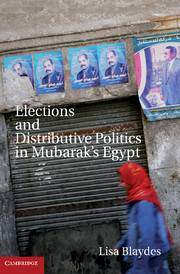Book contents
- Frontmatter
- Contents
- List of Figures
- List of Tables
- Acknowledgments
- 1 Introduction
- 2 Political and Economic Change since 1952
- 3 Elections and Elite Management
- 4 The Politics of Infrastructure Provision
- 5 Electoral Budget Cycles and Economic Opportunism
- 6 Vote Buying, Turnout, and Spoiled Ballots
- 7 Elections and Elite Corruption
- 8 Elections and the Muslim Brotherhood
- 9 Liberal Intellectuals and the Demand for Democratic Change
- 10 Foreign Pressure and Institutional Change
- 11 Egypt in Comparative Perspective
- 12 Conclusion
- Bibliography
- Index
3 - Elections and Elite Management
Published online by Cambridge University Press: 04 February 2011
- Frontmatter
- Contents
- List of Figures
- List of Tables
- Acknowledgments
- 1 Introduction
- 2 Political and Economic Change since 1952
- 3 Elections and Elite Management
- 4 The Politics of Infrastructure Provision
- 5 Electoral Budget Cycles and Economic Opportunism
- 6 Vote Buying, Turnout, and Spoiled Ballots
- 7 Elections and Elite Corruption
- 8 Elections and the Muslim Brotherhood
- 9 Liberal Intellectuals and the Demand for Democratic Change
- 10 Foreign Pressure and Institutional Change
- 11 Egypt in Comparative Perspective
- 12 Conclusion
- Bibliography
- Index
Summary
The long-standing conventional wisdom regarding why authoritarian regimes establish parties, hold elections, and convene legislatures is that these institutions convey an aura of legitimacy, both domestically and to the outside world. Domestically, most autocrats enjoy the power and institutional capacity to impose their policy preferences autonomously. Nevertheless, it is often preferable to rule under the cover of formal legislative institutions with ruling parties comprising a parliamentary majority. In fact, in many authoritarian regimes, there is surprising attention paid to issues of procedural integrity, even when passing the most undemocratic of laws. The existence of elections and parliaments also conveys an appearance of legitimacy to the outside world. Authoritarians reap the benefits associated with perceived liberalization through establishing institutions that appear democratic. The United States and Europe then offer aid or preferential trading arrangements in exchange for such liberalization, and international financial institutions offer cut-rate loans. A number of scholars assume or even actively promote the idea that elections confer legitimacy on authoritarian and “transitioning” regimes in Africa (Mozaffar 2002; Moehler 2005), Central Asia (Schatz 2006), China (Heberer 2006), the Arab world (Hudson 1991), and more generally (Schedler 2002).
My contention, however, is that the quest for legitimacy is only half the story. There is, in fact, a more compelling explanation, namely, that elections are a tool to manage domestic political elite, upon whom the authoritarian relies for regime stability.
- Type
- Chapter
- Information
- Elections and Distributive Politics in Mubarak’s Egypt , pp. 48 - 63Publisher: Cambridge University PressPrint publication year: 2010

